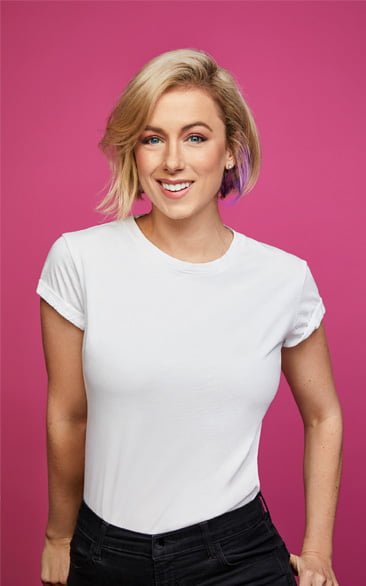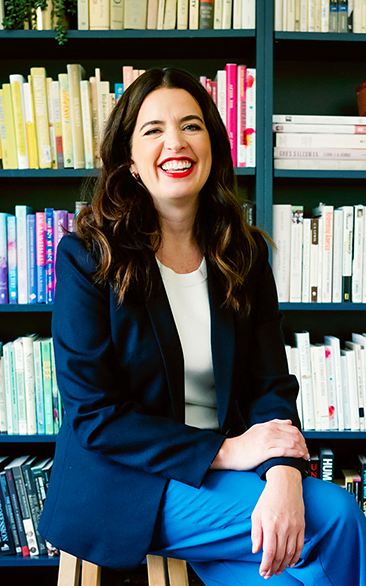Kate Bowler: Oh, hello! My name is Kate Bowler, and this is Everything Happens. So I started saying something a couple of years ago as a way to sum up my theory on life and started saying, “Have a beautiful, terrible day!” Yeah, it’s partly because I can never quite manage the awkwardness of being honest, but it felt like there’s just something there, right? That life is just gorgeous and it’s also usually profoundly difficult, simultaneously. I was in the midst of a really, frankly, garbage season of unending chronic pain. I just I was having very weird symptoms from this joint disorder that I have. And sometimes my body just does not work the way it should. And I couldn’t figure out a way not to just chase pain from one joint to the next. And I was trying everything. I was right back to that sort of season where sometimes you find yourself seeing every single specialist and repeating the same story over and over and over again, but with a lot of hand gestures. I know so many of you know this reality about how much time it takes up, being in pain. And what it costs you emotionally, mentally, physically. So my day became this very constrained thing where I knew that by the time I woke up, I really just had a very narrow window where my brain was clear and could do something useful. So I was like, okay, this is… I think it’s just a habit I picked up from cancer time, which is if you get the window, then take it. So I took my 30 good minutes and I started thinking, “Well, what do I need to live like this today?” So I started writing out little prayers and blessings and maybe, I don’t know, advice for myself of what I needed to live like that. I realized I needed a lot of honesty. I needed the chance to laugh at how ridiculous things were, and I needed some answers where I could find some. I needed hope and courage to face a day that felt like an obstacle course. And the result of all that is my new book. Oh, it comes out in January and it’s called—you know, predictably—Have a Beautiful, Terrible Day! And I thought of it like it’s a devotional for the rest of us, which is to say the people who don’t always have magical lives that always work out for the best. And yeah, if any of that is interesting to you, it is available for preorder at your favorite retailer. And you can hear my voice, you know how it goes like…I don’t believe in lessons. But you’re still learning, right? As you go? So I can say, honestly, that even as my pain subsided, thank God, it taught me things that I still need. Honesty, laughter, hope, people who get it. And that’s just a big part of what I get to do here with you at the podcast is, “Hey, here are other people who get it.”.
Kate: And you know that I have a very soft spot in my heart for comedians. So you’re going to love my guest today. My guest today is the brilliant and irreverent comedian Iliza Schlesinger. And you probably know her from her bajillion Netflix specials. I mean, she has like six Netflix specials. Iliza is a comedian, and an actress, and a producer. She has a razor sharp wit and unapologetic humor. She has a unique way of making us laugh while also tackling topics that, you know, feel close to home. This is a conversation that I had at the Aspen Ideas Health Festival with her, and it was recorded on location in Aspen, Colorado. It was the funniest situation. It was like it’s this big, gorgeous tent out on a green, green lawn with mountains in the distance. And, oh, my gosh, it was also a moment in which I was experiencing vertigo for the first time in my life. I wish you could have seen me try to get on stage. I was like, “Hey, can you guys cut the camera feed in the moment in which I had to use both railings?” And then, like aggressively pat the bottom of my chair because right in front of me were a couple senators and Dr. Anthony Fauci. Who was just in endlessly endearingly good health sitting right there in front of us. And so, Iliza and I just felt the surreal oddness, I think, of the moment. And we were sitting in front of people who are really trying to think about health policy and all of its implications. And so you’ll be able to hear some of the like, oh my gosh, hot topics, What are we doing with health today? Kind of in her voice. But she’s so candid, especially about things that many women can relate to, just the sheer exhaustion that comes from juggling all of life’s demands the way that we, oh, wear it sometimes like a badge of honor. She talks about pregnancy loss, a topic that’s often in the shadows, and how our accounts of self-care really go off the rails when, you know, we start suggesting that bubble baths become the solution to all of life’s problems. So here is me and Iliza. You can hear that I am, like, so excited. And maybe just just know that at that moment I was really focusing on seeing one Iliza and not two vertigo Ilizas. Here she is.
Kate: Yay! Oh, my gosh. I’m so excited to be here with you,.
Iliza Shlesinger Me too.
Kate: Iliza, I’m an enormous fan. I watched all six of your Netflix specials. I am a keen observer of your world tours, your two insanely hilarious books. You built this incredible reputation. So in preparation for our time today, I thought, like, what kind of reputation? You know?
Iliza: Yep. I ask myself that.
Kate: What words might we use? So I conducted a brief but unbelievably scientific survey earlier this morning in the bathroom here at the Aspen Ideas.
Iliza: That’s where Gallup does most of their work, the women’s restroom.
Kate: Yes. Pew gets right in there. And I asked them which of the following terms they might use for you. And these words immediately came to the surface. Number one, authentic.
Iliza: Wow! Thank you.
Kate: Two, funny.
Iliza: Fair.
Kate: Three, not embarrassed by events which humiliate normal people.
Iliza: It’s a superpower.
Kate: Four, good at dancing—I don’t think that’s relevant for our time.
Iliza: That one’s supposed to be filmed.
Kate: But five, bracingly honest. And it sort of feels like honesty is at a bit of a premium right now. And maybe right now we’re in a place where we long to be honest about who we are and what we’ve been through. But we might find it a little bit difficult to get going
Iliza: Yeah, I mean, I think honesty is the root of comedy, which is the only thing I’m qualified to speak on. And I am like humbled to be looking at Anthony Fauci, like I’m like, should I be up here? I just think that the truth will set you free. And especially in comedy, you know, when you…when your currency is vulnerability and when you are honest, whether it is about how you’re actually feeling or about whatever it is you’re going through, it’s…you let other people in. And I think the root of comedy is allowing people to be, to feel seen in what you’re saying. I had to think about that once they asked me to speak here, I’m like, “What am I going to do?” But I think that really is what makes people laugh. And I think visibility and people feeling seen so they don’t feel isolated, whether it’s in their communities, or in an audience or day to day, seeing someone else and having that person be honest about whatever it is they’re going through, whether it is cancer or just like really not liking your hair today or regretting that you wore jeans, even though your mom told you to bring nice pants and you did. But then at the buzzer you were like, “I’m going to do me,” and now you’re in jeans. There’s an honesty in that.
Kate: Yes. I like this very hypothetical set of examples.
Iliza: This is not—
Kate: It feels like you were really reaching, reaching for those
Iliza: I walked up to you and I saw you sitting there and I walked up, I was like, “Hey, Kate.” And you were like, “So you went with the jeans?” I did go with the L.A. casual.
Kate: I was a little worried, though. Every time I go into the, like really helpful customer service gondolier outfits that I tend to really sort of specialize in. But you…
Iliza: Gondolier?
Kate: Stop looking at me! You really do, though, have such a, I’m in ministry world, too. And I would I would describe it as, you have a special ministry in particular to women. Because you are so good at validating the intense work of validation that I think we are in special need of right now. You validate our heartbreak, our trauma, our need to wear rompers, and you have very strong beliefs that we’re… Women are uniquely tired right now and not just like a little bit tired, but your suggestion was maybe like, we just might want to be dead for a week.
Iliza: Just to get rid of the under-eye bags! Just so you can do more and stop being criticized. But yeah, I mean, I think there is, I mean, I can only speak from being a woman, it’s the only thing I have any real authentic experience with. And even that I might be canceled for. But I think if we’re just honest with each other and you see it in all forms, whether it’s on, I forgot, there’s like a whole flap over here. Sorry. Whether it’s on the internet or on Tik tok or just what’s in the ether, there is a value in that honesty about being tired. Again, just so, because we are charged with doing it all. And every interview I get, you know, it’s never about the quality of the work or the hustle or the grit. It’s like, “How are you balancing it all?” And the answer is, “I pay a nanny.” And nobody—that’s the answer, is money. But that’s how you do it. Nobody wants to say that. And like a functioning husband. And just being honest about those things. That may not be…
Kate: I like where you set the bar.
Iliza: A function. But whether it’s, even if it’s not someone else’s truth, at least it was my truth. And people love to criticize for that. But at least at the end of the day, you will feel good having been honest. And then you’re your burden is lifted mentally.
Kate: Because I, I, I guess I, in my experience being diagnosed with cancer, I realized that honesty was going to be the first—.
Iliza: I can’t trump that. Like, you said that and now I’m like, what am I supposed to say
Kate: Yeah. We’ll just, and we’re done.
Iliza: She said, cancer, so.
Kate: Clear the chairs! That would be great. But I did. I guess every time I listen to you, I always think if we can be funny about it, then maybe there’s a path. No, correction. If YOU can be funny about it, then there’s a path for the rest of us to even have a shot at saying like, is there a little nugget in here that…
Iliza: Are you talking about like a miscarriage? Is that you’re talking about?
Kate: Well, I guess I was, I mean, I was thinking of the first moment that I ever walked into a cancer center and they had an, honest-to-God, harp player in the lobby who was trying to like ding, ding, ding, ding, ding to, like, soothe the patients.
Iliza: This is what heaven’s going to be like. Like, that’s so morbid! Like, get used to it. Like, why the harp? I guess it’s better than like a Seinfeld baseline.
Kate: Or like a like a womp womp [sad trumpet sound]. Which would have been more realistic.
Iliza: As they collect all your insurance info. Sorry, no offense, BlueCross.
Kate: Womp womp. What is your preferred instrument of doom? But I grabbed my dad’s hand and was like, “Is it really this bad?” There was a point in there, Iliza, which has wafted away, about…
Iliza: It was about laughing at the—because you said you make it funny. And then I was like, “Well, I don’t have cancer.” So that’s what I thought we were talking about—go on. Humor in that.
Kate: And you have I mean, been, I would say, a trailblazer in talking about things that other people…you go where others fear to tread. And one is about, honesty, about something that one in eight women go through, which which is loss of a pregnancy.
Iliza: Yeah. I mean, I talk about it in my last special simply because I didn’t…from the get go, I didn’t feel embarrassed or bad about it. Maybe because I have good, a good mother. Or maybe it’s because I live somewhere like L.A., where people are hyper liberal. But I it never occurred to me that I was supposed to feel ashamed or embarrassed, and so I just chose not to. And I think that a lot of women and, you know, I was so excited to try to retain as much as I could about all of the panels and all the discussions about women’s health and equity and all that stuff, because if we can just have these things be normalized in conversation? Just as normal as, say, a conversation about Cialis or Viagra…
Kate: Say more about that, Iliza.
Iliza: If it lasts more than 4 hours you call your doctor. Not the conversation. No one wants to. But if it could just be normalized. You know, it doesn’t have to, and starting with, you know I just said it onstage because I just felt…I felt so supported and validated and what I thought and felt maybe somebody somewhere who was afraid or ashamed would hear that, and they would just get a little kernel of hubris, you know, and they would just feel a little bit better about it because it isn’t your fault, it isn’t an embarrassment. It certainly shouldn’t be punished. And just emboldening women to say, “This is what I have. I have a period, I’ve had a miscarriage, I have menopause.” It’s not disgusting. It’s not weird. I mean, sometimes it is. Like even as I said, period, I was like, don’t say that to these people. But removing that stigma, generationally, so that it is a normalized conversation. So I just do it because I didn’t feel bad about it. And it’s one of the few things I didn’t feel bad about. Unlike the jeans. And so just speaking about it so that it becomes normalized so that we can all laugh at it or just discuss it. Yeah.
Kate: Yes. We’ll be right back.
Kate: I just have really enjoyed the long list of things that you highlight for women that we just shouldn’t feel bad about anymore. The endless, wearying scrutiny of our parenting or other people’s parenting or our bodies or other people’s bodies
Iliza: Who has the time? Who has the time to care if another mother is like breastfeeding for three years? Like, get a hobby. I was one—when I was having my baby, it was like, “Oh, watch out for the competitive parenting.” And I’m like, who is even listening to that? Aren’t you busy, like chopping up sandwiches into little circles to give to your kid? Aren’t you busy with your career? You know, we all like to hate watch. We all enjoy the schadenfreude of someone else, just like eating it publicly. But who has the time to, like, actually write a comment or criticize or write legislation that prohibits a woman having an abortion? Like, get a life. So. It all has to do with, we keep women forever striving for these very small things, whether it is the perfect body or the perfect beachy wave or the perfect lip gloss. And while we do enjoy these things at a certain level as women, I do believe these are distractions for greater things. And pitting women against each other is the ultimate long con of, I guess, misogyny. Just this idea that we should always be like mom on mom. I know it sounds like a porn, but it’s not. I’m sorry I said that. We should always be woman on woman. It’s always about female CEOs. Like, which one’s better, which one’s more cancelable? Meanwhile, you have men out there doing horrific things repeatedly. But I’m sitting here busy criticizing you about how you raised your kid, and feeling validated. Meanwhile, horrible things are happening under our watch and we’re too busy being, worrying about all of these small things that don’t actually matter. No one’s ever going to finally go up to you and be like, “Here’s your trophy. You were beach ready for the summer. You did it.” Who cares? You have the perfect beachy waves.
Kate: Is the award is the award ceremony at the beginning of June or the end of August?
Iliza: No one wants to see us after. Yeah. At the beginning when our hair’s all nice. Yeah.
Kate: I love, too. What you said about even, even our most celebrated forms of female empowerment. Like “Boss Lady.”
Iliza: Oh, my God. We only have 8 minutes, uh….
Kate: You’re like, “I’ll take 40.”
Iliza: If you haven’t watched the special, I basically posit that, you know, we have all these sort of fourth wave feminist empowering terms like “Boss Queen,” “Yes Girl,” like twerking on the weekend, white wine, a lot of wine, rosé all day, white wine and slay. Like, that’s not feminism. It’s alcoholism. It’s and it’s not my truth. Like, I can’t have a glass of wine. I’ll get a headache, especially at this altitude, right? But all of that language, you know. Yes queen, work queen, twerk queen. First of all, it was stolen from black and gay and trans and drag queens like that’s from those people…appropriated to be this empowering language. But it’s not, it doesn’t feel good. And so you have all these women saying these words that are inherently not feminist because men can’t use them also. And it’s marginalizing like if you were at work and your boss pulled you aside (your male boss, obviously if you want to get it done). And your male boss, it works better in a, at a show. Your male boss pulled you aside and were like, “Keep it up, power bitch.” Like “You’re a juicy, thick queen.” You’d know you would call HR. Like that would be… And so these things are shoved down our throats, these ever-evolving terms that I don’t think make a woman with a brain, like, feel good. And so I’m like, let’s stop parsing out language that’s just for women. Like, I will accept, like, a pat on the back, respectfully, “Good job,” “Keep it up,” “Kick ass,” any day over like, “You juicy unicorn, keep thriving and slaying.”
Kate: At which point I take out a juicy unicorn tote bag to hand you…
Iliza: But why is it so wet?
Kate: Exactly. It’s so moist.
Iliza: We lost you there. That’s okay.
Kate: I think, too, your description of how our, even our accounts, then, of mental health and self-care and wellness really go off the rails. There was this…I’ve been writing this history of self-help.
Iliza: Right, because you have a real job.
Kate: Oh, it’s just me and a lot of spreadsheets.
Iliza: So many people’s ears just perked up. Spreadsheets?
Kate: Yes, say more about your dataset. The the the New Year’s resolutions really dovetails with a kind of madness I think we have about what constitutes things that build up our mental resilience. And it became just like cold water plunges, a lot of cold baths. And like bubble bath will also fix the the great derailment of feminism, sound baths, maybe? Energy baths? Just a lot of baths. But you’re really hoping maybe we can be like a little less precious about our self care language and maybe bump it up into something more realistic, like treatment for bipolar with medical…
Iliza: Yeah. Like sometimes, like, yeah, you need, like, a reuptake inhibitor, not like a bath. I think people are probably doing the best that they can with what they have. And because we don’t have access to the proper language. And I do think, you know, there’s a ubiquity in terms like, “Oh, this person’s a narcissist or bipolar.” Like we, the masses who indulge in pop psychology constantly assigning all these things and all these deeply psychological terms to people. And it’s like because there’s such a lack of access to the appropriate care, people, instead they turn to these minor things. But like, self-care to me, I mean, yeah, a bath is nice and lighting a candle, but self-care might actually be screaming. Self-care might actually be confronting that person and having the language and the empowerment to do so, so that you aren’t filming yourself taking a bath. But then again, if you can make money off of that reel, then maybe that is self-care. Maybe that’s okay. I watch a lot of like, 23 year old girls, like “Come along with me while I empty my fridge.” And I’m like, I will watch all of this. I will watch idiots unload their fridge all day. You guys got to get on TikTok.
Kate: It’s it’s a real bevy of health solutions.
Iliza: It doesn’t hurt my brain at all.
Kate: The framework of, like, laughter as the best medicine really kind of got me thinking about the wisdom of of Jack Handey in his Deep Thoughts with Jack Handey. In which he recalled, something like, “My dad used to say that laughter was the best medicine. But maybe that’s why several of us died of tuberculosis.” Right. So, just since we’re in the closing session together, I thought maybe this might be the time that we solve the problems of Aspen Health.
Iliza: Oh. I didn’t see every talk. Yeah.
Kate: Ha! “I didn’t see every talk, but if I had…”
Iliza: But I did take a lot of free snacks. I did.
Kate: But since we have Dr. Fauci here, it feels like maybe the right time to suggest like a laughter-only policy going forward.
Iliza: Is that something you would feel comfortable implementing? A regimented laughter-only. That sounds like a Black Mirror episode. No frowns or else you get cancer.
Kate: I could not love you more, Iliza. Thank you so much for the absurdity of being willing to be interviewed by a historian.
Iliza: Thank you
Kate: I accept. I accept. Thank you for the validity. Thank you, my love.
Iliza: Thank you!
Kate: Ugh, I just love her so much. Laughter may not be the medicine to solve all of our problems, but it is certainly something I need. I think maybe because the root of comedy is connection. It’s about making people feel like they’re not alone in their experiences. Maybe especially the absurd or uncomfortable ones. Like chronic pain or trying to juggle everything that life is throwing at us, or living in a world that seems to be on fire around us. How do we live with all this reality? Maybe we can take a second to laugh, too. So before I go, I wanted to close with a blessing. Maybe something from my new book, Have a Beautiful, Terrible Day. It is for those times when we feel like we’re just drowning in other people’s needs and problems and we might need a second of peace. So. All right, if you’re feeling a little tired, this one’s for you.
Kate: God, I am a shape shifter hidden in plain sight. A great disappearing act. Every now and again when I’m spinning in a tornado of other people’s needs and wants, I worry that if I stepped out of it to stand dumbfounded for a moment, my body would cast no shadow. God, I vanish. The unnecessary pain and necessary needs of others feel durable, measurable. God, look at how much they need me. Isn’t it necessary that I’m not myself today? God remind me of my own goodness. The way you look at me and grin, the way the earth can stretch to hold my own dreams when I remember them. God, let my stomach grumble and I eat. Let me be delighted and I laugh. Let me tire and I rest. Give my heart peace today as I am here, surprisingly myself, while the world spins and spins. Bless you my dears.
Kate: And hey, I don’t need to remind you because everyone, everywhere is, but Advent starts soon. And we have a free daily devotional for the Christmas season, if that’s your kind of thing. If you go over to KateBowler.com/advent, you can download it. And hey, I hope it’ll give you a little bit of peace this season. And this is the part of the episode where I get to thank everybody who makes this work amazing. I really have the most generous and wonderful partners. This whole thing is possible because the amazing people at the Lilly Endowment and the Duke Endowment and they are people who work so hard and they support storytelling about faith and life. And I am so grateful to them and thank you to my home at Duke Divinity School and our podcast network, Lemonada. And of course, a huge shout out to my absolutely incredible, seemingly inexhaustible team, Jessica Richie, Harriet Putman, Keith Weston, Gwen Heginbotham, Brenda Thompson, Hope Anderson, Kristen Balzer, Jeb Burt and Katherine Smith. And hey, we love hearing from you. Leave us a voicemail and we might even be able to use it on the air. Call us at 9193228731. All right, lovelies. I’m going to be talking to an incredible person in next week’s episode. It’s Bozoma Saint John. She is remarkable. You’re not going to want to miss it. But in the meantime, come find me online at @KateCBowler. This is Everything Happens with me, Kate Bowler. Oh, shoot, real quick, yes. If you liked this conversation, could you do me a massive favor and leave us a review on Apple Podcasts or Spotify? I know it’s annoying to always, like, do an extra thing, but it just takes a few seconds. And strangely, it makes a huge difference to how people find us. And hey, make sure you’re subscribed while you’re there. I realized yesterday that I was not actually subscribed to my own podcast. You have to click a little, subscribe “plus” button. You’ll find it, all right, don’t be like me. Okay. I’ll see you there.












Leave a Reply